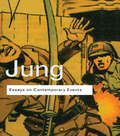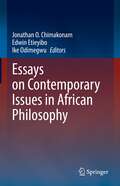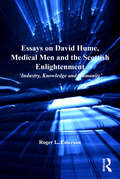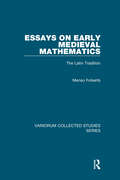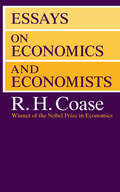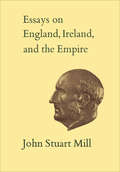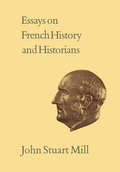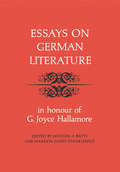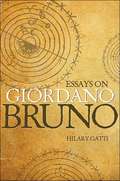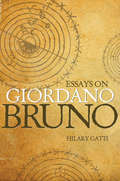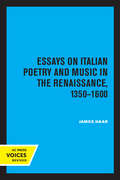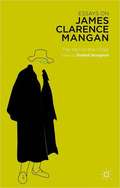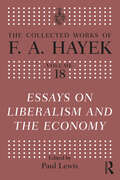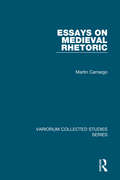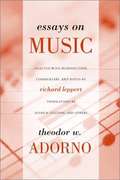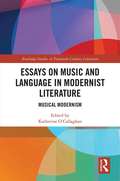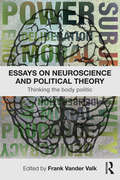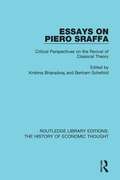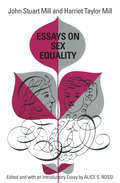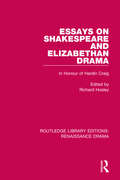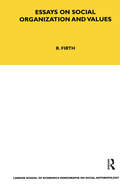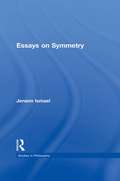- Table View
- List View
Essays on Contemporary Events (Routledge Classics)
by C. G. JungWas the leading psychologist of his time a Nazi sympathiser? This was the question asked by many after the Second World War, as they sought to explain Jung's actions and publications during Nazi rule. So great was the controversy that his reputation risked being permanently damaged. Essays on Contemporary Events was the first broadside in his vigorous defence of his beleaguered reputation. This remarkable work is essential reading for anyone seeking to understand Jung. It will enable the reader to decide: was Jung wholly innocent of the accusations or had he, like so many others, fallen under the Nazi spell and was now trying to make amends.
Essays on Contemporary Issues in African Philosophy
by Jonathan O. Chimakonam Edwin Etieyibo Ike OdimegwuThis volume is a collection of chapters about contemporary issues within African philosophy. They are issues African philosophy must grapple with to demonstrate its readiness to make a stand against some of the challenges society faces in the coming decade such as xenophobia, Afro-phobia, extreme poverty, democratic failure and migration. The text covers new methodical directions and there is focus on the conversationalist, complementarist and consolationist movements within the field as well as the place of the Indigenous Knowledge System.The collection speaks to African philosophy’s place in intellectual history with coverage of African Ethics and African socio-political philosophy. Contributors come from a variety of different backgrounds, institutions and countries. Through their innovative ideas, they provide fresh insight and intellectual energy. The book appeals to philosophy students and researchers.
Essays on David Hume, Medical Men and the Scottish Enlightenment: 'Industry, Knowledge and Humanity' (Science, Technology And Culture, 1700-1945 Ser.)
by Roger L. EmersonThe Scottish Enlightenment was a period of intellectual and scientific progress, in a country previously considered to be marginal to the European intellectual scene. Yet the enlightenment was not about politeness or civic humanism, but something more basic - the making of an improved society which could compete in every way in a rapidly changing world. David Hume, writing in 1752, commented that 'industry, knowledge and humanity are linked together by an indissoluble chain'. Collectively this volume of essays embraces many of the topics which Hume included under 'industry, knowledge and humanity': from the European Enlightenment and the Scots relation to it, to Scottish social history and its relation to religion, science and medicine. Overarching themes of what it meant to be enlightened in the eighteenth century are considered alongside more specific studies of notable figures of the period, such as Archibald Campbell, 3rd Duke of Argyll, and David Hume, and the training and number of Scottish medical students. Together, the volume provides an opportunity to step back and reconsider the Scottish Enlightenment in its broader context and to consider what new directions this field of study might take.
Essays on Early Medieval Mathematics: The Latin Tradition
by Menso FolkertsThis book deals with the mathematics of the medieval West between ca. 500 and 1100, the period before the translations from Arabic and Greek had their impact. Four of the studies appear for the first time in English. Among the topics treated are: the Roman surveyors (agrimensores); recreational mathematics in the period of Bede and Alcuin; geometrical texts compiled in Corbie and Lorraine from Latin sources from late antiquity; the abacus at the time of Gerbert (pope Sylvester II.); and a board-game invented in the first half of the 11th century (the 'Rithmimachia') to help people to learn mathematics. Included in the volume are critical editions of several texts, e.g. that of Franco of Liège on squaring the circle, Bede and Alcuin on recreational mathematics, and part of Pseudo-Boethius' Geometry I. The book opens with a survey of mathematics in the Middle Ages, and ends with a history of Rithmimachia up to the 17th century, when the game fell into disuse.
Essays on Economics and Economists
by R. H. CoaseReflections on two centuries of economic history from a Nobel Prize winner in the field: &“An accessible collection by a renowned economist.&”—Library Journal How do economists decide what questions to address and how to choose their theories? How do they tackle the problems of the economic system and give advice on public policy? With these broad questions, Nobel laureate R. H. Coase, widely recognized for his seminal work on transaction costs, reflects on some of the most fundamental concerns of economists over the past two centuries. In fifteen essays, Coase evaluates the contributions of a number of outstanding figures, including Adam Smith, Alfred Marshall, Arnold Plant, Duncan Black, and George Stigler, as well as economists at the London School of Economics in the 1930s. &“Are you looking for a book by an economist who can really write and has insight after insight on free markets vs. government regulation? Would you like it even better if you could get some good laughs from his clever way of putting things? Then Ronald H. Coase&’s Essays on Economics and Economists is the book for you.&”—Reason
Essays on Eddic Poetry
by John Mckinnell Donata Kick John ShaferEssays on Eddic Poetry presents a selection of important articles on Old Norse literature by noted medievalist John McKinnell. While McKinnell's work addresses many of the perennial issues in the study of Old Norse, this collection has a special focus on the interplay between heathen and Christian world-views in the poems.Among the texts examined are Hávamál, which includes an elegantly cynical poem about Óðinn's sexual intrigues and a more mystical one about his self-sacrifice on the world-tree in order to gain magical wisdom; Vǫlundarkviða, which recounts an elvish smith's revenge for his captivity and maiming; and Hervararkviða, where the heroine bravely but foolishly raises her dead father to demand the deadly sword Tyrfingr from him.Originally published between 1988 and 2008, these twelve essays cover a wide range of mythological and heroic poems and have been revised and updated to reflect the latest scholarship.
Essays on Education in the Early Republic
by Robert Coram Frederick Rudolph Benjamin Rush Noah Webster Samuel Harrison Smith Amable-Louis-Rose De Lafitte Du Courteil Samuel Knox Simeon DoggettOnly a relatively few colonial Americans received any formal education beyond the elementary subjects. Secondary schools were rare. Private tutors and the local clergyman carried the main burden of college preparation. There were public secondary schools in New England, a few private schools in the middle colonies, and even fewer in the South--all of them concentrating on the Latin that led to college and a career in one of the learned professions. Nine colleges of varying degrees of stability and age carried on in the New World the collegiate traditions of Oxford and Cambridge. Several of these institutions were barely able to prove their existence before the American Revolution gave a new twist to their fortunes.
Essays on England, Ireland, and Empire: Volume VI
by John Stuart Mill John Robson Joseph HamburgerJohn Stuart Mill's political essays are a blend of the practical and the theoretical. In this volume are gathered together those in which the practical emphasis is more marked; those in which theory is predominant are found in Essays on Politics and Society, Vols XVIII and XIX of the Collected Works. The Essays on England, Ireland, and the Empire are mainly from Mill's early career as a propagandist for the Philosophic Radicals (a term he himself coined). They provide a contemporary running account of British political issues at home and abroad, with a vigorous and sometimes acerbic commentary. Historians as well as political scientists will find interesting details of the view from the radical side, and all students of Mill will welcome the further elucidation of his development. Of special interest are his precocious if tendentious attack on Hume's History of England, and his reactions to Canadian and Irish issues, the latter being the subject of a previously unpublished manuscript. The textual apparatus includes a collation of the manuscript materials and identification of Mill's quotations and references.
Essays on French History and Historians: Volume XX
by John Stuart Mill John Robson John C. CairnsJ.S. Mill's deep interest in French intellectual, political, and social affairs began in 1820 when, in his fourteenth year, he went to France to live for a year with the family of Sir Samuel Bentham. French became his second language, and France his second home, where he died and was buried in 1873. His interest in history began even earlier when, as a child of seven, he tried to imitate his father's labours on the History of British India; though he never wrote a history in his maturity, study of the past remained a passion and helped shape the philosophy of history that informed his views of society and ethics. His intense interest in contemporary French politics also led him to seek connections between historical developments and present trends, both seen by his from a Radical perspective approproate to what he believed to be an age of transition. The English historians of France, including Walter Scott and Thomas Carlyle, as well as the French, some of whom were themselves political figures, are judged by their historical methods, but those methods are seen as having practical effects in shaping as well as revealing the mind of the times.This volume brings together for the first time the essays, running from 1826 to 1849, that meld these abiding interests. They give as well insights into Mill's personal aspirations, his developing view of comparative politics and sociology, his concern for freedom, and his feminism. During these years Mill worked on a published his System of Logic, Book VI of which shows in condensed form the results of the speculations here developed; reading these essays with that work, which made his reputation as a philosopher, enables one to see the effects of romanticism on analytic thought in a way not as clearly evident even in Mill's Autobiography. Independently important, then, the essays in this volume also enable us to interpret anew the practical and theoretical concerns fundamental to his formative years and maturity.John C. Cairns' Introduction demonstrates how the essays reveal, through their reactions to the Revolutions of 1789, 1830, and 1848, and to French historiography, politics, and thought, the effect of France on Mill's ideas, and also the way in which his other concerns influenced his reactions to France. The texts, with the variants and notes that are the hallmark of this edition, are described in John M. Robson's Textual Introduction, which explains the editorial principles and methods.
Essays on German Literature: In Honour of G. Joyce Hallamore
by Michael S. Batts Marketa Goetz StankiewiczThe present Festschrift serves a dual purpose: firstly, to honour Professor Joyce Hallamore for her contribution to German studies in Canada, particularly at the University of British Columbia; secondly, to document the flourishing state of German studies in this country. Former and present students of Professor Hallamore were asked to contribute essays from their varied fields of interest which she has stimulated and fostered; furthermore, colleagues across Canada were invited to contribute the results of their research: the broad theme of this second group of essays is the complex relationship between nineteenth and twentieth century literature which has been the centre of Professor Hallamore's own scholarly work.<P><P> This volume commemorates Professor Hallamore's forty years of scholarship and teaching--the time given by her to the University of British Columbia, not only to the formation and growth of the Department of German (which she has headed for some twenty years) but to the expansion of the University as a whole. It demonstrates at the same time through breadth and variety the coming of age of German studies in Canada, which Professor Hallamore has fostered.<P>Although the essays in this volume vary in approach, the result shows a remarkable harmony of outlook, which gives evidence of the authors' conscious effort to reconsider critically traditional categories and attitudes in literary criticism. This harmony of outlook--found in the whole range of papers from the youngest to the most mature scholar--reflects the spirit and work of the person whom the volume is honouring.
Essays on Giordano Bruno
by Hilary GattiThis book gathers wide-ranging essays on the Italian Renaissance philosopher and cosmologist Giordano Bruno by one of the world's leading authorities on his work and life. Many of these essays were originally written in Italian and appear here in English for the first time. Bruno (1548-1600) is principally famous as a proponent of heliocentrism, the infinity of the universe, and the plurality of worlds. But his work spanned the sciences and humanities, sometimes touching the borders of the occult, and Hilary Gatti's essays richly reflect this diversity. The book is divided into sections that address three broad subjects: the relationship between Bruno and the new science, the history of his reception in English culture, and the principal characteristics of his natural philosophy. A final essay examines why this advocate of a "tranquil universal philosophy" ended up being burned at the stake as a heretic by the Roman Inquisition. While the essays take many different approaches, they are united by a number of assumptions: that, although well versed in magic, Bruno cannot be defined primarily as a Renaissance Magus; that his aim was to articulate a new philosophy of nature; and that his thought, while based on ancient and medieval sources, represented a radical rupture with the philosophical schools of the past, helping forge a path toward a new modernity.
Essays on Giordano Bruno
by Hilary GattiThis book gathers wide-ranging essays on the Italian Renaissance philosopher and cosmologist Giordano Bruno by one of the world's leading authorities on his work and life. Many of these essays were originally written in Italian and appear here in English for the first time. Bruno (1548-1600) is principally famous as a proponent of heliocentrism, the infinity of the universe, and the plurality of worlds. But his work spanned the sciences and humanities, sometimes touching the borders of the occult, and Hilary Gatti's essays richly reflect this diversity. The book is divided into sections that address three broad subjects: the relationship between Bruno and the new science, the history of his reception in English culture, and the principal characteristics of his natural philosophy. A final essay examines why this advocate of a "tranquil universal philosophy" ended up being burned at the stake as a heretic by the Roman Inquisition. While the essays take many different approaches, they are united by a number of assumptions: that, although well versed in magic, Bruno cannot be defined primarily as a Renaissance Magus; that his aim was to articulate a new philosophy of nature; and that his thought, while based on ancient and medieval sources, represented a radical rupture with the philosophical schools of the past, helping forge a path toward a new modernity.
Essays on Italian Poetry and Music in the Renaissance, 1350-1600 (Ernest Bloch Lectures #5)
by James HaarThese essays illuminate the changing nature of text-music relationships from the time of Petrarch to Guarini and, in music, from the madrigals of Giovanni da Cascia to those of Gesualdo da Venosa. Haar traces a line of development from the stylized rhetoric of Trecento song through the popularizing trends of Quattrocento music and on to the union of verbal and musical cadence that marked the high Renaissance in sixteenth-century Italian music. This title is part of UC Press's Voices Revived program, which commemorates University of California Press’s mission to seek out and cultivate the brightest minds and give them voice, reach, and impact. Drawing on a backlist dating to 1893, Voices Revived makes high-quality, peer-reviewed scholarship accessible once again using print-on-demand technology. This title was originally published in 1986.
Essays on James Clarence Mangan: The Man in the Cloak
by Sinéad SturgeonThis is the first collection of essays to focus on the extraordinary literary achievement of James Clarence Mangan (1803-1849), increasingly recognized as one of the most important Irish writers of the nineteenth century. It features contributions by acclaimed contemporary writers including Paul Muldoon and Ciaran Carson.
Essays on Liberalism and the Economy (The Collected Works of F.A. Hayek #18)
by F.A. HayekA deft selection of unpublished and little-known works by F. A. Hayek that will serve to enlighten and enliven debates around the ever-changing face of Western liberalismAcross seventeen volumes to date, the Collected Works of F. A. Hayek series has anthologized the diverse and prolific writings of the Austrian economist synonymous with classical liberalism. Essays on Liberalism and the Economy traces the author’s long and evolving writings on the cluster of beliefs he championed most: liberalism, its core tenets, and how its tradition represents the best hope for Western civilization. This volume contains material from almost the entire span of Hayek’s career, the earliest from 1931 and the last from 1984. The works were written for a variety of purposes and audiences, and they include—along with conventional academic papers—encyclopedia entries, after-dinner addresses, a lecture for graduate students, a book review, newspaper articles, and letters to the editors of national newspapers. While many are available elsewhere, two have never appeared in print, and two others have not been published in English. The varied formats collected here are enriched by Hayek’s changing voice at different stages of his life. Some of the pieces resonate as high-minded and noble; some are meant as cuts to "intellectuals" (a pejorative term when used by Hayek) like Keynes and Galbraith. All serve to distill important threads of his worldview.
Essays on Medieval Rhetoric (Variorum Collected Studies #1006)
by Martin CamargoOriginally published between 1981 and 2003, the thirteen essays collected here cover topics in medieval rhetoric from its origins in late antiquity through the end of the Middle Ages. Most of the essays are concerned with the teaching of prose composition, especially the art of letter writing known as the ars dictaminis, and many of them focus on specific textbooks that were used for such instruction, in particular those composed in England from the twelfth through the fifteenth centuries. Individual essays are devoted to works by major figures such as Saint Augustine, Peter of Blois, and Geoffrey of Vinsauf; to teaching programmes at important academic centres such as Oxford and Bologna; and to such topics as the relationship between the art of letter writing and the art of poetry, the oral dimension of medieval epistolography, the manuscript traditions of influential textbooks, medieval genre terminology, and the position of medieval rhetoric within a continuous disciplinary history rooted in classical rhetoric.
Essays on Music
by Theodor W. Adorno Richard D. Leppert Susan H. GillespieThis unique volume includes twenty-seven essays on music by Theodor W. Adorno, nearly half of which are translated into English for the first time, together with an expansive introduction, commentary, and notes by musicologist Richard Leppert.
Essays on Music and Language in Modernist Literature: Musical Modernism (Routledge Studies in Twentieth-Century Literature)
by Katherine O'CallaghanThis volume explores the role of music as a source of inspiration and provocation for modernist writers. In its consideration of modernist literature within a broad political, postcolonial, and internationalist context, this book is an important intervention in the growing field of Words and Music studies. It expands the existing critical debate to include lesser-known writers alongside Joyce, Woolf, and Beckett, a wide-ranging definition of modernism, and the influence of contemporary music on modernist writers. From the rhythm of Tagore’s poetry to the influence of jazz improvisation, the tonality of traditional Irish music to the operas of Wagner, these essays reframe our sense of how music inspired Literary Modernism. Exploring the points at which the art forms of music and literature collide, repel, and combine, contributors draw on their deep musical knowledge to produce close readings of prose, poetry, and drama, confronting the concept of what makes writing "musical." In doing so, they uncover commonalities: modernist writers pursue simultaneity and polyphony, evolve the leitmotif for literary purposes, and adapt the formal innovations of twentieth-century music. The essays explore whether it is possible for literature to achieve that unity of form and subject which music enjoys, and whether literary texts can resist paraphrase, can be simply themselves. This book demonstrates how attention to the role of music in text in turn illuminates the manner in which we read literature.
Essays on Neuroscience and Political Theory: Thinking the Body Politic
by Frank Vander ValkThe past 20 years have seen increasingly bold claims emanating from the field of neuroscience. Advances in medical imaging, brain modelling, and interdisciplinary cognitive science have forced us to reconsider the nature of social, cultural, and political activities. This collection of essays is the first to explore the relationship between neuroscience and political theory, with a view to examining what connections can be made and which claims represent a bridge too far. The book is divided into three parts: Part I: places neuroscience as a social and political practice into historical context Part II: weaves together the insights from contemporary neuroscience with the wisdom of major figures in the history of political thought Part III: considers how neuroscience can inform contemporary debates about a range of issues in political theory This work brings together scholars who are sceptical about the possibility of integrating neuroscience and political theory with proponents of a neuroscience-informed approach to thinking about political and social life. The result is a timely and wide-ranging collection of essays about the role that our brain might play in the life of the body politic. It should be essential reading for all those with an interest in the cutting edge of political theory.
Essays on Northeastern North America, 17th & 18th Centuries
by John G. ReidIn examining the history of northeastern North America in the seventeenth and eighteen centuries, it is important to take into account diverse influences and experiences. Not only was the relationship between native inhabitants and colonial settlers a defining characteristic of Acadia/Nova Scotia and New England in this era, but it was also a relationship shaped by wider continental and oceanic connections. The essays in this volume deal with topics such as colonial habitation, imperial exchange, and aboriginal engagement, all of which were pervasive phenomena of the time. John G. Reid argues that these were complicated processes that interacted freely with one another, shaping the human experience at different times and places. Northeastern North America was an arena of distinctive complexities in the early modern period, and this collection uses it as an example of a manageable and logical basis for historical study. Reid also explores the significance of anniversary observances and commemorations that have served as vehicles of reflection on the lasting implications of historical developments in the early modern period. These and other insights amount to a fresh perspective on the region and offer a deeper understanding of North American history.
Essays on Piero Sraffa: Critical Perspectives on the Revival of Classical Theory (Routledge Library Editions: The History of Economic Thought)
by Bertram Schefold Krishna BharadwajThe papers collected in this book, first published in 1990, represent the edited proceedings of a conference held to celebrate the 25th anniversary of the publication of Piero Sraffa’s Production of Commodities by Means of Commodities. In arranging the conference, and subsequently during the editing of the papers, great care has been taken to invite scholars of different schools of thought to contribute. The result of this collection of ideas has resulted in a most promising critique and provides an extensive alternative to modern Neo-Classical theory, of interest to all students of economic thought.
Essays on Sex Equality
by John Stuart Mill Alice S. Rossi Harriet Taylor MillThis volume brings together for the first time all the writings of John Stuart Mill and Harriet Taylor Mill on equality between the sexes, including John Stuart Mill's The Subjection of Women, a classic in the history of the women's rights movement since its publication one hundred years ago. Also contained in this volume is a major interpretative essay by Alice S. Rossi on Mill and Harriet Taylor which describes and analyzes their long personal and intellectual relationship.
Essays on Shakespeare and Elizabethan Drama: In Honour of Hardin Craig (Routledge Library Editions: Renaissance Drama #Vol. 5)
by Richard HosleyThe twenty-eight essays of this collection, first published in 1962, are the work of distinguished British, Canadian, and American scholars. The essays range widely over the field of Elizabethan drama, concentrating attention on Shakespeare and Marlowe but not neglecting earlier dramatists such as Kyd and Greene or later ones such as Heywood and Massinger. Among the general topics treated are the staging of the interludes, intrigue in Elizabethan tragedy, and Jacobean stage pastoralism. This title will be of interest to students of English literature.
Essays on Social Organisation and Values (London School Of Economics Monographs On Social Anthropology Ser. #No. 28)
by Raymond FirthIn this volume Professor Firth has brought together and commented upon a number of his papers on anthropological subjects published over the last thirty years. All these essays relate in different ways to his continuing interest in the study of social process, especially in the significance within a social context of individual choice and decision. Although some specialist studies are included, e.g. the group of papers dealing with the Polynesian island of Tikopia, the main themes of the book are broad ones and there are important general essays on such topics as social change; social structure and organization; modern society in relation to scientific and technological progress; and the study of values, mysticism, and religion by anthropologists. There is also a hitherto unpublished chapter on anthropology as a developing science.
Essays on Symmetry
by Jenann IsmaelDrawing from physics and philosophical debates, Ismael combines a set of essays on the time worn debate of symmetry from both fields.
